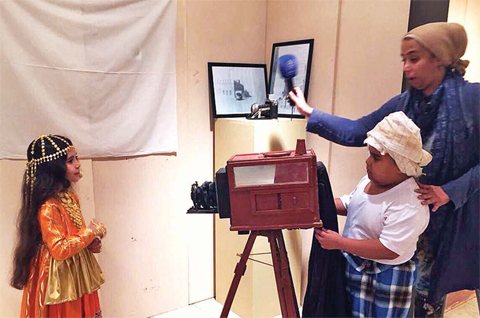There are many benefits to allowing children to act. For instance, acting can help develop a child’s self esteem and self confidence. It can also provide an expected source of revenue to help fund the child’s education and expenses and help the child develop a talent and skills useful for future career options. There are a growing number of child acting and drama classes and workshops for kids in Kuwait as well as public speaking and speech classes. For some parents, it’s worth trying it to see if their children enjoy the experience.
A positive life experience
Emily Cunha and Tanya Killeen are the mothers of Neve and Lily Rose, cute little kids who participated in a short film for the Ministry of Education titled "Tolerance”. Cunha and Killeen are friends and both found the experience positive.
"My daughter is a shy child, but when the camera rolls she becomes a completely different person, she will start smiling and posing,” explains Killeen who also starred in the short film to remain close to her daughter and also encourage her.
Neve, on the other hand, didn’t love acting though she showed remarkable composure and talent for one so young. Both moms, however, are aware of the darker side of child acting and were careful to guard against it.
"Sometimes people mistake their own ambitions for their children’s,” noted Cunha. "Sometimes children just say they want to do something to please us or because someone told them they ought to be in movies or even because they look up to a friend or sibling who is a child actor. And that is why I prefer to let Neve make her own choice in acting.”
The many challenges
Other parents learn from experience the challenges their children may face when becoming child actors. Parents themselves are often the managers and there is a lot of work involved. They must schedule appointments and put together headshots and resumes. In Kuwait, since the industry is not well organized or regulated by the government, it’s necessary also to know the reputations of producers and directors to be able to choose wisely among projects.
Child actors that participate in one or two films are less likely to be affected but those who adopt acting as a full time profession may see their studies suffer or be subject to bullying.
Eight year old Laila Al-Randi started modeling when she was 5 years old and soon got noticed by local agencies. "Her first work was in the soap opera ‘Bent w Shaieb’,” explained sister Munerah. "Then advertisements and more videos.”
Bullying on set and at school
Laila sometimes skips school due to shooting schedules and she has also been the subject of bullying. Online she’s faced criticism for her looks and wearing makeup; at school kids have been even more harsh. "Kids at my school make fun of my hair for being big and curly,” Laila says. "And they said ‘Do not be arrogant, because you are an actress now, you are nothing!”
There are also few protections here for children actors and they may face unreasonable work hours, lack of insurance, unscrupulous producers that fail to pay acting fees and other health and work-related issues.
"Laila had an accident while working, After finishing a scene in a movie, Laila went through a glass door, which broke in her face and now she has a big scar above her right eye , she got 12 stitches in her head and three in her eyes, but she received no work injury compensation. Laila cried a lot, hated to see people and she hated even herself when she looked at the mirror but now she is better .”
The role of the parent-manager
Watching out for the child’s best interest is the typically the role of the parent and in Kuwait, like most parts of the world, that too can require balancing one’s own ambitions with the wants and needs of the child.
"We faced a lot of deception and sometimes Bader worked for directors who then never paid him,” explains Amal Al-Rumaidhen, mother of well known child actor 6 year old Bader Al-Atwan. Fighting for reasonable pay and reasonable hours is a necessary part of being the parent of a child actor in Kuwait.
"The most difficult thing for him is to work late and for days at a time - sometimes for a fee of only KD 50. Sometimes he works till 5am. Directors should care that child actors are not like adult actors they should be on time, not making the kid come from 8am and his scene at 1pm!” Al-Rumaidhen said.
Alternatively, working with children - and their parent managers - has its challenges.
"Parents sometimes are late or don’t show up at all, and that’s why when we choose a child we consider not only that the child can act but also if his parents are free to bring him,” noted Ema Shah, producer and a translator in the film Tolerance.
Tolerance Director Abdulaziz Mandani was himself a child actor and therefore has a good idea of how to get the best from his youngest stars.
"The secret behind dealing with child actors is to be a child, and that’s how I speak with them,” he explains. Mandani gets down to their eye-level and ask them to do whatever he wants.
In filming Tolerance, Mandani had a hard time getting young Neve to cry. "So I asked the cameraman to keep rolling, and told the actor who will ‘kidnap’ her to grab her hand when her mother looked away, and that is how I got the perfect scene for the short-film,” he said.
By Faten Omar



